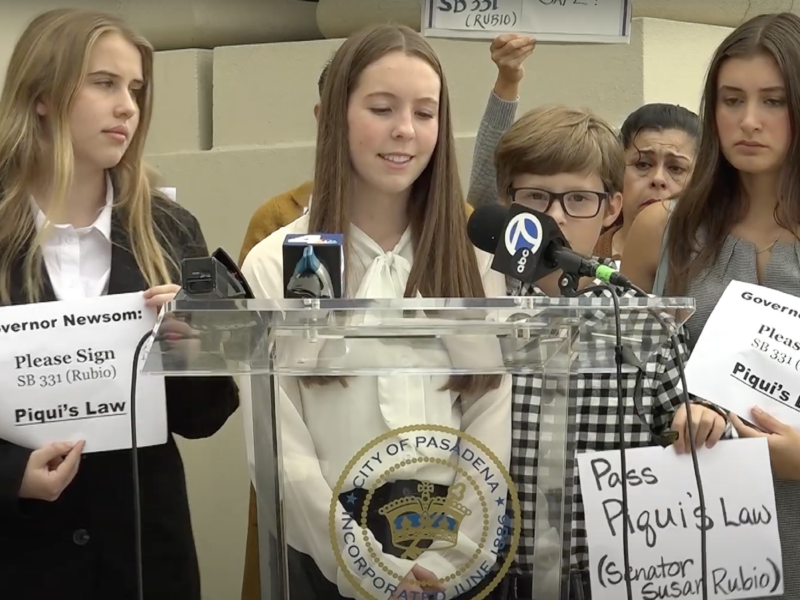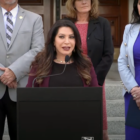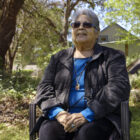The future is uncertain for California Proposition 1, which looks like it might pass by a razor-thin margin and would expand the state’s mental health and substance abuse treatment infrastructure. As votes are still being tallied, we bring you this story from news outlet MindSite News about a San Francisco organization that is filling a glaring void in the health care system.
California
State Bill to Keep Children Safe in Custody Battles Passes First Hurdle
California’s Senate Judiciary Committee Tuesday night unanimously endorsed a bill that would require what children’s advocates describe as crucial reforms to ensure children are safe amid contentious custody proceedings.
California
California Could Allow Electronic Recording in Civil and Family Court, Helping Poor Litigants
State Sen. Susan Rubio has introduced a bill that would allow California’s 58 trial courts to digitally record civil and family law cases, a controversial effort to address statewide courtroom staffing shortages that deprive low-income litigants of official court transcripts. Court reporters provide verbatim documentation of proceedings that are critical to filing appeals, reviewing judges’ behavior and reading back proceedings to jurors.
California
Plan for 82,000 Homes in San Francisco Moves Forward, Under Pressure From State
The Board of Supervisors passed a plan to build 82,000 housing units over the next eight years, maintaining city control over the permitting and building processes. Some critics said the plan does not do enough to prevent low-income residents from displacement as more market-rate apartments are built.
Aging
Research on Climate Change and Health Reveals Risks for Older Adults: Q&A With Dr. Andrew Chang
Dr. Andrew Chang, an attending physician specializing in cardiology at the Veterans Affairs Palo Alto Health Care System and postdoctoral research fellow at the Stanford Cardiovascular Institute, is investigating how the biological mechanisms of aging and a warming world will affect the health of older adults.
California
Phil Ting – District 19 State Assembly Member Candidate Response
The Public Press invited candidates to share audio responses to questions that we formed using survey responses from the San Francisco community. Candidates for District 19 State Assembly were given the following question:We asked San Francisco residents to tell us about the most pressing issues in their districts. According to survey responses we received, homelessness and housing affordability are the top concerns citywide. If you are elected to the State Assembly, what do you plan to do about these issues?
Coercive Control
When Judges Dismiss Claims of Domestic Abuse, Children Can Die
Lawmakers, experts and advocates across California are pushing for legislation that would make judges take regular training in recognizing domestic violence and child abuse. The crusade is an attempt to lessen the chances that a judge will place a child in the custody of a dangerous parent. Family court judges routinely decide that domestic abuse claims are not credible and grant custody to the allegedly abusive parent. But making the wrong call can end with children losing their lives.
Coercive Control
California Judges’ Group Helped Block Bill to Address Family Violence, Calling Training Mandate ‘Advocacy’
A state senator said she withdrew a proposal to reform the family court system in August after harsh criticism from the California Judicial Council, which called requiring extra training on family violence law burdensome and reflective of an “advocacy agenda.”
“Civic” Podcast
Coercive Control Victims Face Skeptical Judges, Court Transcripts Show
On average in the U.S., more than 1 in 3 women, and 1 in 4 men, will experience physical violence, rape or stalking by an intimate partner, according to the National Domestic Violence Hotline. Nevertheless, when victims turn to family court for protection from their abusers, they often face skeptical judges. And that’s especially true when the abuse doesn’t leave a mark.
Government & Politics
California Indian Tribes Denied Resources for Decades as Federal Acknowledgement Lags
In the last 13 years, the U.S. Department of Interior has actively reviewed applications for acknowledgement of only 18 tribes, even as hundreds remain in line. The Public Press has identified more than 400 tribes seeking federal recognition and is working to confirm that 200 others with publicly listed applications are genuine.
Many have been waiting for decades. The Death Valley TimbiSha Shoshone Band is the only California tribe that has been recognized in the 44 years since the federal acknowledgement process was established.
Transportation
Uber, Lyft Must Adopt Measures to Prevent Sexual Assaults, California Regulator Rules
Nine years after becoming the first agency in the nation to legalize ride-hailing — and after thousands of publicized sexual assaults on Uber and Lyft rides — the California Public Utilities Commission for the first time is requiring the industry to adopt comprehensive measures to prevent such attacks.
In a previously unreported vote last month, the commission issued a decision requiring that all ride-hailing firms train drivers to avoid sexual assault and harassment, adopt procedures for investigating complaints and use uniform terminology in their annual reports to the agency so it can accurately monitor them.




















